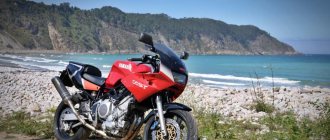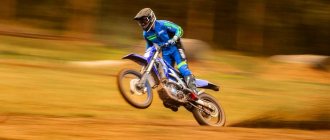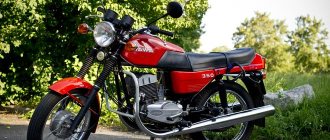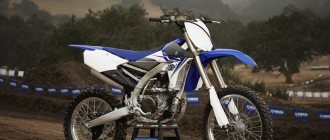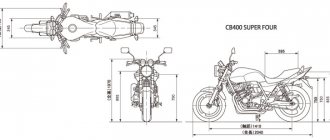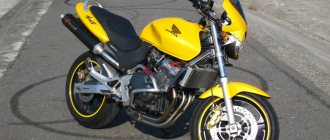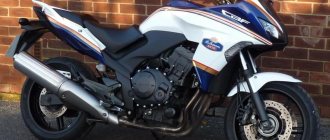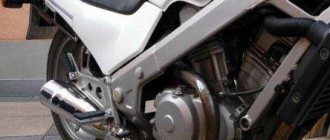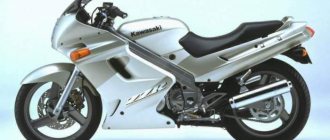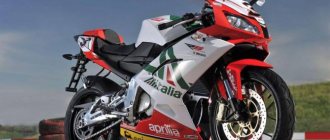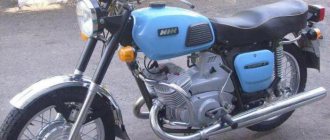Yamaha Serow 250 review
The foundation around which the entire motorcycle is built is the frame, encased in steel and plastic. The light, attractive and moderately aggressive design has won the hearts of a huge number of motorcyclists, ensuring the Yamaha Serow 250 enormous popularity. Designers from the world-famous Italian studio Pininfarina worked on the appearance of the enduro, who managed to breathe into it a drop of bright interest and their own zest, which makes the car stand out among its analogues.
The model is available in two versions - motard and enduro, differing only in suspension settings and wheels. The motorcycles are created on the same basis - a steel frame, a carburetor, a 249 cubic centimeter engine, an air cooling system and a chain drive. The transmission is a five-speed and is quite loud, as is typical of most air-cooled Yamahas. At the same time, the gearbox is very reliable and has clear gear shifting.
At 6500 rpm both maximum torque and maximum power are achieved, which is quite interesting, unusual and serves as excellent proof that the bike maintains its dynamics at peak power. The Yamaha Serow 250 not only starts off briskly, but also accelerates at full speed, leaving many of its classmates behind in these parameters. The engine power - 21 horsepower - is more than enough for such behavior, especially considering the fact that the curb weight of the bike is a maximum of 120 kilograms, depending on the model year.
One of the most important characteristics of an off-road enduro is its suspension, represented by a 35 mm telescopic fork at the front and a monoshock absorber with preload adjustment at the rear. Of course, the Serow is not designed for high jumps, but the bike can handle a slalom through a windfall forest or a long race.
The lightweight design provides excellent handling and excellent power efficiency. Of course, you can find more powerful enduro models, but the compact Yamaha Serow 250 is capable of giving a head start to many of its competitors.
Video
Not all motorcyclists know about the Yamaha XT 225 Serow
, because this bike appeared back in 1985. However, the model turned out to be so successful that it was discontinued after 17 years. At that time, the Japanese made it exclusively for their own market, but now many copies of this motorcycle are riding around Russia.
When you first look at this Yamaha, you doubt the adequacy of Japanese engineers. Most motorcyclists consider the bike to look unattractive and unsightly. But this is at first glance - with further use, you come to the understanding that there is absolutely nothing superfluous in the Yamaha XT 225 Serow. In addition, at one time the famous Italian company Pininfarina had a hand in the design of the motorcycle.
Why Serow? Translated from English into Russian, this literally means “mountain goat” or “goral”. In the encyclopedia, regarding the second definition, it is written that “an animal similar to a goat is called a goral. It is not suitable for long runs, but it climbs hard-to-reach rocks.” In principle, this is not surprising, since the bike belongs to the off-road class, and it is a pleasure to ride in the mountains.
According to reviews from a few owners, the engineers designed the gas tank inconveniently. The saddle is small and low. Because of this, tall people feel at least uncomfortable on a bike. But such motorcyclists don’t even look at this Yamaha, since it doesn’t fit into their background. The motorcycle can accelerate quite quickly up to 130 km/h. The Yamaha XT 225 Serow engine has little power, but it is durable and has a huge resource. This approach is understandable - you simply cannot drive other two-wheeled vehicles in the mountains, and reliability comes to the fore.
The Yamaha XT 225 is in perfect order with the suspension. In front there is a telescopic fork, simple, but impressively thick and long-stroke, and thanks to it the motorcycle can withstand monstrous loads. At the rear, engineers made a monoshock absorber. During the production of the motorcycle, it was modified only twice - motard and enduro. However, there are almost no differences between them. An average of 3 liters of gasoline is spent per hundred kilometers. It depends on what speed and what surfaces you move on.
The main full-fledged advantage of the motorcycle is that it overcomes mountain slopes without problems. Sometimes you get the feeling that a person simply would not have gotten into such places without this Yamaha. To summarize, we can say that for lovers of extreme recreation and similar trips, the Yamaha XT 225 Serow is suitable, but you should not expect impressive results from it. Other owners believe that the motorcycle is simply undervalued.
Such a motorcycle is rarely found on sale, but its value on the secondary market is low, perhaps because the Serow 225 is a very rare motorcycle and therefore illiquid.
Model history
Serial production of the Yamaha XT 250 motorcycle started in 2005. Two years later, the model received an injection power system, which replaced the carburetor.
In 2015, Yamaha released a limited anniversary edition of the model, dedicated to the 30th anniversary of the model line. The special version of the Serow 250 featured a unique grey-orange color scheme.
At auctions and the Japanese domestic market, the Yamaha Serow 250 is divided into two generations:
- The first, produced from 2005 to 2006.
- The second, which has been produced since 2007 to the present day.
The difference between generations lies only in the power system - injection or carburetor, since no other differences, either external or technical, were noticed.
Engine
The Yamaha XT 250 is powered by a single-cylinder, four-stroke engine with a displacement of 249 cubic centimeters, a peak power of 21 horsepower and a maximum torque of 20.5 Nm. The chassis, like the power unit, is almost completely borrowed from the previous generation - Serow 225 - and is represented by a front telescopic fork and a rear adjustable monoshock absorber. The most serious changes made to the technical component of the motorcycle were the introduction of an electric starter and the elimination of the kick starter. Since 2007, it began to be equipped with an injection power system, which replaced the carburetor.
Technical characteristics of Yamaha Serow 250
The technical component of the Japanese motorcycle is significantly superior to most analogues in the enduro class. The steering system is almost perfect, and a wide range of settings allows you to adjust the car to a specific driving style and make it incredibly obedient.
The Yamaha Serow 250 consumes about 2-3 liters of fuel per 100 kilometers. Consumption may vary depending on road surface and riding style, but remains incredibly economical for a motorcycle of this class.
Main technical characteristics:
- Steel frame.
- Single-cylinder four-stroke engine with a displacement of 249 cubic centimeters.
- The compression ratio of the fuel mixture is 9.5:1.
- Air cooling system.
- Two valves per cylinder.
- Carburetor fuel system for models manufactured before 2007; after - injection.
- Ignition type CDI, since 2007 - TCI;
- Peak engine power is 21 horsepower.
- Maximum torque at 6500 rpm is 20.5 Nm.
- Five-speed transmission.
- Chain drive.
- Single disc front brake 245 mm with two-piston caliper.
- Rear single disc brake with single piston caliper.
- Front telescopic suspension fork with 226 mm travel.
- Rear pendulum suspension with monoshock absorber and rebound adjustment, travel - 180 millimeters.
- Dimensions - 2150x805x1160 millimeters.
- The height of the saddle is 810 millimeters.
- Fuel tank volume is 9.8 liters.
- The curb weight of the motorcycle is 132 kilograms.
Yamaha Serow 250 is rightfully considered one of the most compact, light and elegant in its class. Representatives of enduro, as a rule, do not have a particularly attractive design, but this model is an exception to their rule: the aesthetic exterior with chrome-plated steel elements and thoughtful details cannot but attract attention.
Peculiarities
Owners note several features inherent in Serow:
- Reliable suspension with a wide range of settings.
- Efficiency when driving off-road.
- Peak power and maximum torque are achieved at 6500 rpm.
Motorcyclists pay special attention to the last point: the motorcycle maintains dynamics while driving due to the coincidence of torque and maximum power at the same number of revolutions. Thanks to this, the Yamaha XT 250 is considered one of the best motorcycles among small capacity bikes.
Short base
This is a small motorcycle, with a wheelbase shortened by 100mm. When purchasing, you need to take this feature into account. The disadvantages of this solution include less stable behavior at high speed. But in return, we get the maneuverability of a mountain goat and noticeably less weight. And what an advantage this is! You can crawl on this motorcycle without any problems, even along very difficult mountain trails, without experiencing any major problems.
Dimensions
The curb weight of the motorcycle varies from 110 to 120 kilograms depending on the year of manufacture. A full 9.8 liter fuel tank increases the bike's weight to approximately 130 kilograms. With a consumption of about three liters per 100 kilometers, Serow is capable of covering a long distance and has good autonomy. The length of the motorcycle is 2150 mm, width - 805 mm, height - 1160 mm, seat height - 810 mm.
Brake system and chassis
The motorcycle frame is entirely steel, perfectly fitting into the overall design of the motorcycle thanks to the efforts of specialists from the Italian Pininfarina studio. The neat wheels of the motorcycle and the standard enduro steering wheel are perfectly aligned and not only add elegance to the appearance of the machine, but also provide ideal handling and obedience.
The Serow rear suspension is represented by a pendulum mechanism with a monoshock absorber, the front suspension is a 35 mm telescopic fork.
The braking system consists of a rear 203 mm disc with a single-piston caliper and a front 245 mm disc with a two-piston caliper.
Enduro motorcycle with title for public roads
Another pleasant bonus of the Motoland XT250 HS is the presence of a version with a technical vehicle passport (PTS). For many, having this document is very important, because an enduro motorcycle with a title can be registered with the State Traffic Safety Inspectorate and can be driven on public roads. Of course, on the enduro version of the Motoland XT250 HS motorcycle with PTS, all lighting devices are present, such as turn signals, headlights and brake lights. In addition, the motorcycle is equipped with a cool digital instrument panel indicating the gear engaged, mirrors and footrests for the passenger. Oh yes, the rear right turn signal melts under the pressure of hot exhaust gases. Remember what I said about thoughtfulness? So, this only applies to the version of the motorcycle without a title. And in this case, everything that is needed for driving on the additional road protocol was simply crap, no matter how, as long as it was there. There is no other way to say it. But at least the PTS version exists and that’s good. And you can show a turn with your hand
